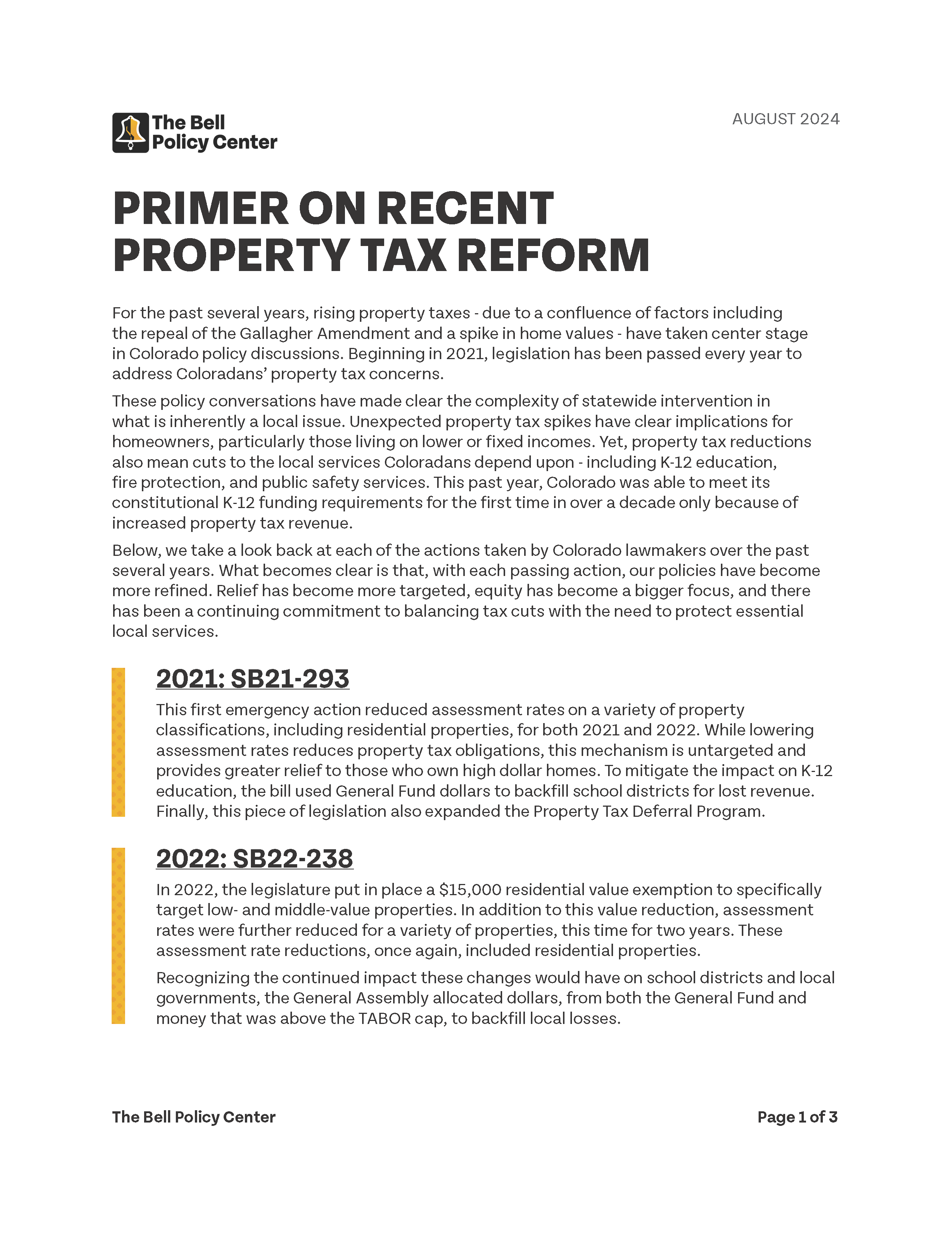Primer on Recent Property Tax Reform
For the past several years, rising property taxes – due to a confluence of factors including the repeal of the Gallagher Amendment and a spike in home values – have taken center stage in Colorado policy discussions. Beginning in 2021, legislation has been passed every year to address Coloradans’ property tax concerns. These policy conversations have made clear the complexity of statewide intervention in what is inherently a local issue. Unexpected property tax spikes have clear implications for homeowners, particularly those living on lower or fixed incomes. Yet, property tax reductions also mean cuts to the local services Coloradans depend upon – including K-12 education, f ire protection, and public safety services. This past year, Colorado was able to meet its constitutional K-12 funding requirements for the first time in over a decade only because of increased property tax revenue. Below, we take a look back at each of the actions taken by Colorado lawmakers over the past several years. What becomes clear is that, with each passing action, our policies have become more refined. Relief has become more targeted, equity has become a bigger focus, and there has been a continuing commitment to balancing tax cuts with the need to protect essential local services.
This first emergency action reduced assessment rates on a variety of property classifications, including residential properties, for both 2021 and 2022. While lowering assessment rates reduces property tax obligations, this mechanism is untargeted and provides greater relief to those who own high dollar homes. To mitigate the impact on K-12 education, the bill used General Fund dollars to backfill school districts for lost revenue. Finally, this piece of legislation also expanded the Property Tax Deferral Program.
In 2022, the legislature put in place a $15,000 residential value exemption to specifically target low- and middle-value properties. In addition to this value reduction, assessment rates were further reduced for a variety of properties, this time for two years. These assessment rate reductions, once again, included residential properties.
Recognizing the continued impact these changes would have on school districts and local governments, the General Assembly allocated dollars, from both the General Fund and money that was above the TABOR cap, to backfill local losses.
In the 2023 extraordinary session, after the failure of Proposition HH at the ballot, residential assessment rates were further decreased and value exemptions on the residential side were increased to $55,000 for property tax year 2023. It is important to note that the larger exemption for residential property had different effects across the state. Because of the flat nature of the exemption, many communities with lower value homes – like those in southeast Colorado – saw very low or negative property tax revenue growth. These policy changes, in turn, were more likely to have impacted service provision in these areas of the state.
Recognizing the continued impact these changes would have on school districts and local governments, the General Assembly allocated dollars, from both the General Fund and money that was above the TABOR cap, to backfill local losses.
During the same extraordinary session, the legislature passed HB23B-1003 to create a Property Tax Commission, made up of elected representatives and senators, local government officials, business groups, public education advocates, fire chiefs and other special district representatives, and property tax administrators. The purpose of the Commission was to discuss different ways to bring permanent property tax policy forward in a balanced and bipartisan fashion.
This bipartisan bill, approved by 92 out of 100 legislators, was meant to provide a new, long-lasting, property tax framework for Colorado. Taking recommendations from the Property Tax Commission, it made a number of significant changes to the property tax system. It split the residential assessment rate into two – one for school district mills and the other for other local governments. This was meant to provide long-term protection to K-12 funding.
The bill kept the exemptions and assessment rate decreases from the 2023 extraordinary session in place for 2024, made comparable temporary reductions for 2025, and made permanent changes starting in 2026. For residential properties, it lowered the local government assessment rate permanently and instituted a value exemption of 10 percent for the first $700,000 of property value, helping low- and middle-value homeowners. Assessment rates for commercial and agricultural properties were also lowered starting in 2024.
In addition to the rate decreases and exemptions, there were structural changes made to the property tax system. A cap of 5.5 percent annual growth now governs local government property tax revenue to prevent big spikes in the future. A trigger was also put in place for school district revenue, where the assessment rate for school districts would be temporarily decreased if local property tax revenue made up more than 60 percent of total statewide school funding.

